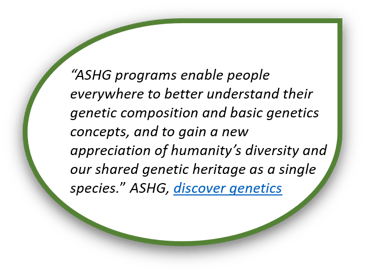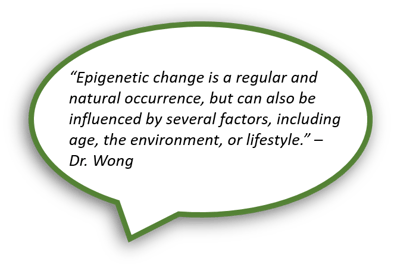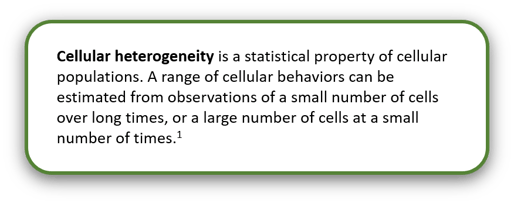2021-12-02
 Every year, we at DNA GenotekTM attend the largest conference in North America, hosted by the American Society for Human Genomics (ASHG). The conference brings together researchers and commercial companies from around the world to share new discoveries and innovations in human genetics and genomics.
Every year, we at DNA GenotekTM attend the largest conference in North America, hosted by the American Society for Human Genomics (ASHG). The conference brings together researchers and commercial companies from around the world to share new discoveries and innovations in human genetics and genomics.
This year, DNA GenotekTM contributed to ASHG with a presentation by Dr. Yen Wong’s on the Comparison of epithelial cell content of oral samples estimated using cytology and DNA methylation.
In the next few paragraphs, we will highlight the most important trends that emerged from the conference and provide a synopsis of Dr. Yen Wong’s presentation.
Trending topics and research at ASHG
This past year was an incredible year for the field of genomics and its related research activities. Even though the conference was virtual for the second year in a row, it still produced hundreds of research abstracts, dozens of daily talks, and incredible workshops and co-labs sponsored by leaders in the genomics industry. This year, we noticed 3 main themes emerging from the talks and research posters:
-
Multiomics
-
Precision medicine and pharmacogenomics
-
Biodiversity in genetic data and diagnostic research
Multiomics
As a trending topic, Multi-omics has grown significantly over the past few years. Many researchers have started collaborating on projects that integrate a multitude of “omes” into their research. The integration of multi-omics in research has unlocked new discoveries and therapeutic approaches to disease treatment.
For example, during the platform session on Multidisciplinary omics approaches for diagnostics, Dmitrii Smirnov, author of “Integration of proteomics with genomics, transcriptomics, and phenomics increases the diagnostic rate of Mendelian disorders”, spoke about how the integration of other ‘omes’ into his genetic research led to resolving 21% of the unresolved cases in whole genome sequencing (WGS)/whole exome sequencing (WES) in Mendelian disorders.
Precision medicine and pharmacogenomics
Personalized medicine is the future of clinical genomics. In fact, a majority of the platform sessions, invited talks, and co-labs are targeting this growing field. Over the past decade, clinical research has expanded how we view therapeutics and medicine. Previously, therapeutics and medicine fell into the “one-size-fits all” approach and were unsuccessful for individuals who underwent treatment.
On Friday Oct 22nd, another platform on Expanding genetic approaches and applications in pharmaco and clinical genomics, featured 6 talks from a variety of researchers. Dr. Binglan Li, from Stanford University, spoke about “The knowledge gap between pharmacogenomics and medical genetics: Is there a bridge in between?” He tackled the challenges that precision medicine faces, including the knowledge gap between medical genetics and pharmacogenomics. He suggested that the quality of healthcare would improve from the point of disease diagnosis to drug prescription and compliance, if pharmacogenomics knowledge was included in every medical process.
Biodiversity in genetic data and diagnostic research
Last year at ASHG, biodiversity grew exponentially as a trending topic among researchers and in the number of talks; and it is no surprise that the discussions are continuing today. If precision medicine is the future of clinical genomics, the data behind it must represent a diverse group of individuals. It is important to study populations that have cultural and societal structures that are dissimilar to western populations.
In the same platform, Dr. Young Euon Ko, from the University of North Carolina, spoke about “Understanding the importance of racial diversity in the development and implementation of pharmacogenomic guidelines in kidney transplant patients receiving tacrolimus.” Her team learned that different ethnic groups in America require different doses of tacrolimus. They found that African Americans have a higher level of inter-individual dose variability, which further emphasizes the need to achieve accurate tacrolimus dosing levels in early treatment. To achieve this need, pharmacogenomics-based dosing may require investigating ancestry-specific dosing algorithms.
Dr. Yen Wong’s Talk - Cellular heterogeneity and epigenetics
 DNA Genotek contributed to ASHG2021 with a presentation, featuring Dr. Yen Wong’s research in salivary epigenetics.
DNA Genotek contributed to ASHG2021 with a presentation, featuring Dr. Yen Wong’s research in salivary epigenetics.
Dr. Wong’s team conducted an Epigenome-Wide Association Study (EWAS), investigating small mutation effects that could be present in complex diseases or due to environmental exposure (epigenetic changes). The study centered on showing how cellular heterogeneity is a major confounder of EWAS. This is due to the cell-type specific state of the annotations, especially those present in oral samples that contain a mixture of epithelial and immune cells. Case-controlled EWAS are particularly sensitive to (un)known confounders.
The study rationale was:
-
Buccal and saliva samples have proven a utility for epigenomics and other cell-based omics.
-
Cellular heterogeneity is the major confounder for EWAS studies and deconvolution of these cellular mixtures is of the utmost importance.
-
The validity of such algorithms has not yet been tested, using cytology of primary samples.
Dr. Wong explained how the collection method can influence heterogeneity in oral samples. For example, buccal swabs contain a higher proportion of epithelial cells than those present in actual saliva; and the same proportion is highly influenced by the individual’s age and oral health status.
The study aimed to:
-
Use cytology to compare the proportion of buccal epithelial cells and white blood cells in oral samples collected, using differing collection methods with ORAcollect•DNA and Oragene•DNA collection kits.
-
Assess yield differences across the different collection methods.
-
Compare epigenomic signatures in the saliva samples collected across the different collection methods to determine whether the cytology counts match the predictive cell proportions estimated by DNA methylation, using EpiDISH algorithm.
 Study findings
Study findings
-
The mean proportion of epithelial cells in Oragene DNA saliva samples was significantly lower than oral samples collected with ORAcollect•DNA.
-
Saliva samples showed a significantly higher mean total DNA yield (per mL) than samples collected with ORAcollect•DNA.
-
The EpiDISH algorithm can be used on DNA methylation data to accurately estimate cellular heterogeneity in Oragene•DNA and ORAcollect•DNA collected samples.
 Here's Dr. Wong’s presentation at ASHG 2021 and a more in-depth explanation of how she used the ORAcollect•DNA and Oragene•DNA collection kits.
Here's Dr. Wong’s presentation at ASHG 2021 and a more in-depth explanation of how she used the ORAcollect•DNA and Oragene•DNA collection kits.
If you are interested in speaking with us about your epigenetic studies, and to learn more about Oragene•DNA and ORA•collect DNA, you can send us an email at info@dnagenotek.com.
Dr. Yen Wong’s Bio
Dr. Wong holds a Ph.D. in Biotechnology from Deakin University. She is a postdoctoral research fellow in the early Life Epigenetics Group, led by Professor Jeffrey Craig in the Institute for Mental and Physical Health and Clinical Translation . Her research areas include investigating and developing epigenetic biomarkers for neurodevelopmental and other chronic disorders. Currently, she is leading a project on optimizing saliva cell-type separation for the early identification of hemolysis in leukemia patients.
Reference
1. Altschuler, S. J. & Wu, L. F. (2010).Cellular heterogeneity: when do differences make a difference?


